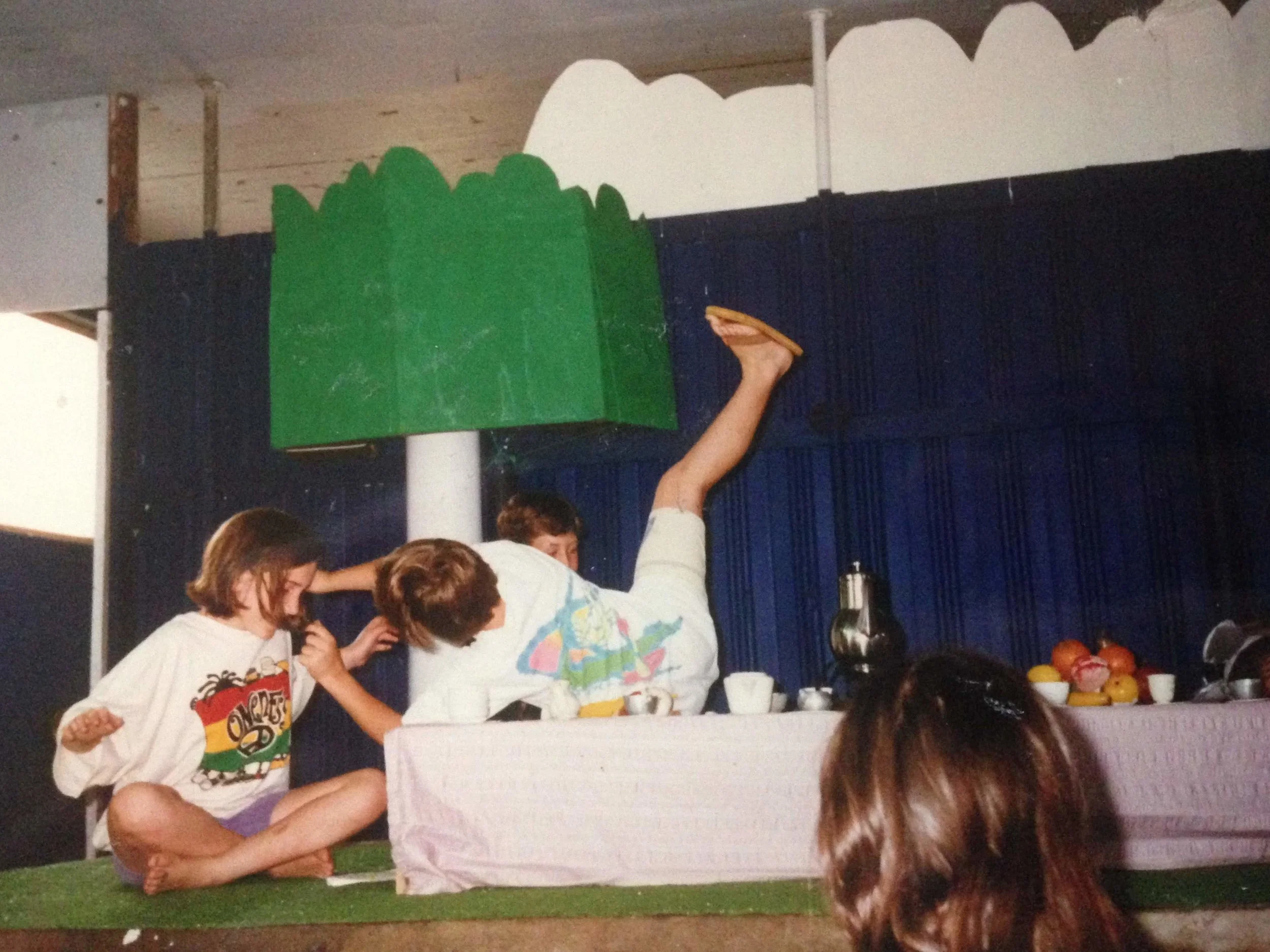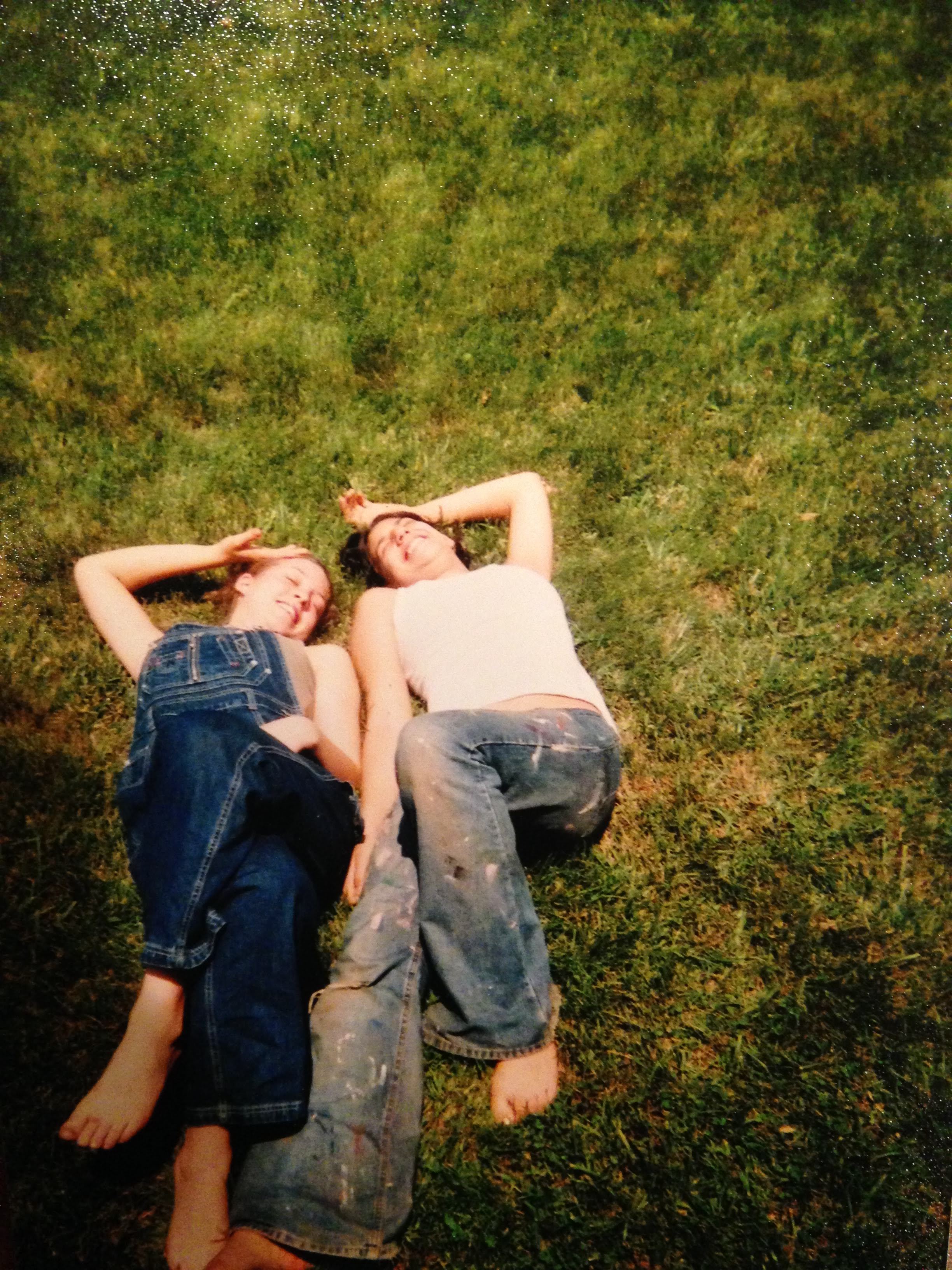What I Learned From Running A Children's Theatre Camp In A Barn For 15 Years
So here’s a thing about me: I grew up in Virginia on a dairy farm and for 15 years my three sisters and I ran a musical theatre summer camp for elementary and middle school children out of the barn. It all started in 1992 when my oldest sister and her best friend decided that instead of just working with the local community theater, they wanted to put on their own plays. So they convinced my dad to clear out what had been the original milking parlor (which, conveniently, had a raised rectangle with a wall behind it, aka a stage) and began what would eventually be a decade and a half long project. For two weeks every summer after the end of school and before the 4th of July, anywhere between 8-20 children would come to our barn, rehearse for 2 hours, learn a cappella renditions of all your classics, and then put on a 40ish minute show. The first show was a 15 minute rendition of Peter Pan. By the end there were was a main stage, a side stage and a raised stage (the cleared off edge of a desk), a giant blue curtain, professional-grade lighting, and about 50 kids who had come in and out.
At this point, the plays have been done for over a decade, the barn is now back to being a storage unit (though set pieces, the curtain pulley and costume closet still remain), and many people have no idea about this strange little corner of my life. But my sisters and I - all of whom are now professionals in their 30’s who really like, and are pretty good at if we may say so, managing people - were recently talking about how, this probably shaped us in fundamental ways that we never fully considered. And so even though I don’t, say, put it on my resume (though maybe I should?! LMK), here is a list of things that I learned from running a children’s theatre camp in a barn for 15 years:
How to do a lot with a little. Our sets were made of sheets, cardboard, fishing wire and staple gun staples. We stood on plastic barrels as ladders. The curtain was sewn by the best friend’s mom. Friends, boyfriends, and parents built set pieces. Everything was painted with whatever wrongly-mixed paint was on sale at the paint store (except the walls which were painted a specific, eponymous Barn Blue). Costumes were made out of thrift store finds, old blankets, trash bags, Hanes multi-pack t-shirts, and donated clothes. After the show, we would have a party in the backyard with cake and ice cream and pass the bucket around to the parents in attendance, usually making about $50 which would be our entire budget for the next year. Things I am very good at: cutting cardboard with box cutters; wielding a staple gun; making a costume out of duct tape.
How to write for your audience. Also editing. Also patience. You know what movies love? Love stories. Aladdin, Singin’ in the Rain, even Newsies shoves one in. You know what elementary school children really don’t care about? Love stories. This was also a time before you could do things like find scripts on the internet, so my sisters and I spent many hours meticulously transcribing Disney movies then editing out all the romance/anything possible salacious and restructuring it until we got it down to a 35-50 minute long show that had enough story to make sense and all the good songs (obvi). I became very comfortable at chopping out large blocks of text for the greater good (of not asking children to smooch).
Mandated breaks are good for morale. This was summer in the South in a giant concrete box. Rehearsals went from 10-12 every weekday with a mandatory popsicle break at 11. Each day the kids would pour out of the barn, march over into the yard, lay in the grass/on the porch/in the shade and take 15 minutes to relax and eat something frozen. I can still feel how good those breaks were, can remember the din of the cast all laughing and talking together. Also one time my dad brought home a puppy during the break (the moral being sometimes when you take a break, you get a puppy).
Hiring the right people. One year, we invited high schoolers to be in the show. Turns out when you can drive yourself to rehearsal you are far less likely to show up. High schoolers were never invited again to be in the musicals.
Collaboration. I don’t know if this was made clear - for 15 years (well.. I was out for 4 of them, more on that below) I did plays with my sisters. For a month straight we sat in a dusty, dirty barn together, cleaning, building sets, editing scripts, figuring out staging and lighting, making costumes, rehearsing, listening to The Smiths and tapes of This American Life episodes, laughing, and also screaming and crying. It was glorious. It was awful. It was a trial-by-fire lesson on how to work with people you love and also hate.
How to learn from mistakes/the power of clear communication and delegation. We were supposed to be done at year 14. The youngest had moved away to college and no one was left to mind the shop. But we decided to come back for a final 15th year, all four of us, inviting our favorite actors to join. The last time we had all worked on a show together the oldest was 18 and the youngest 9, but now we were all adults. We had to discuss: how do we run a show together in a way that we don’t end up accidentally also revising the play of us all sobbing on the floor of the barn at midnight on a Tuesday? So we set up a meeting, sat on a different floor and made a plan. The oldest is… the oldest, so she was still the Director. Her best friend was Co-Director. The second was Music Director. I was Set Designer. The youngest was Stage Manager. And it went great. Everyone knew their lane, it was one that they liked and thrived in, and so they stayed in it. I truly think no one angry-cried the whole time, an impressive feat for four sisters & a faux-sister.
How to give up power. There were two rules for the plays: 1. Mom was not involved. 2. Once you graduated high school, you had to give up your directorship to the next oldest. This meant that the founders only did 5 plays and the only one who was there for all 15 was the youngest. Of course, the Directors Emeritus came home every year to watch, but we were expressly not involved in any way with it’s production. Everything was up to the discretion of the Director. And it still worked great every time! But back to that first part - 1. Mom was not involved. This was the unsung hero in the Giving Up Power Awards. Both for her own sanity and for us, Mom decided very early on that she would not be involved unless absolutely necessary. She didn’t come to rehearsals, didn’t watch us work, didn’t look at the script. She intentionally stayed in the house during rehearsals, both to be available when an adult was called for (which rarely happened) and to not listen to what was going on in the barn. We also kept everyone out of the house, except for rare instances. The house was her space, the barn was ours. It modeled for all of us how to know when to let go and the greatness that could come of it: she got to see the shows with the same fresh eyes as all the other parents, actively didn’t panic about what she couldn’t see, and we got to own every part of what happened.
These lessons ended up living deep in our bones and shaping how we all think about work and management in ways that I never really appreciated until recently. There are also a million more things I could say about the plays, but for now I’ll just scroll though these pictures again.
For the record and (I think) in order of appearance, here are all the shows we did:
Peter Pan
Oliver!
The Jungle Book
Charlie and the Chocolate Factory
Alice in Wonderland
The Aristocats
Newsies
*The Little Prince (one year we did an extra show for high schoolers)
The Wizard of Oz
Singin’ in the Rain
Aladdin/Scheherazade
Robin Hood
Mary Poppins
James and the Giant Peach
The Phantom Tollbooth
Summer Stock (NB: an underrated Gene Kelly/Judy Garland movie about doing a play in a barn)









